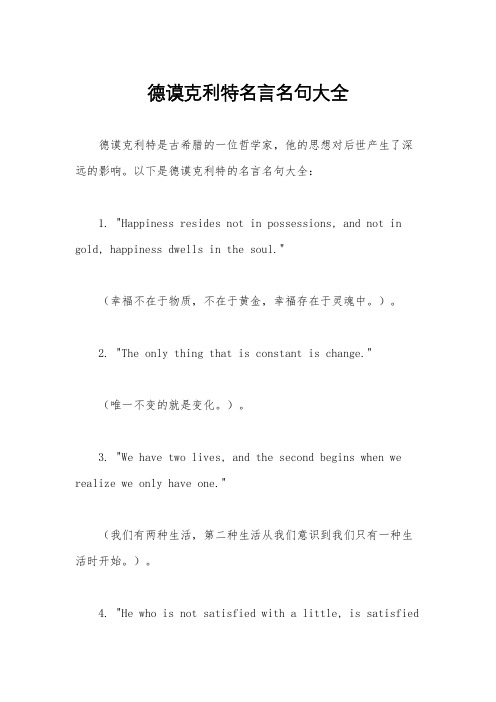德谟克利特
德谟克利特的原子论

德谟克利特的原子论德谟克利特的原子论是古代希腊哲学家德谟克利特提出的一种关于宇宙结构的理论。
他认为,宇宙是由一种不可再分的基本粒子构成的,这种基本粒子称为原子。
德谟克利特的原子论在古代哲学史上具有重要的地位,对后来的科学发展也产生了深远的影响。
德谟克利特认为,宇宙中的一切都是由原子组成的。
原子是一种永恒不变的实体,它们没有形状、大小和颜色,只有质量。
原子之间通过运动和相互碰撞来形成物质的各种形态和性质。
德谟克利特认为,原子运动是无限多样的,它们在空间中不断地做无规则的运动,并且以各种不同的方式相互碰撞。
这种运动和碰撞产生了物质的多样性。
德谟克利特的原子论还涉及到原子的大小和形状。
他认为,原子有不同的大小和形状,这决定了它们之间的相互作用和组合方式。
不同大小和形状的原子可以形成不同的物质,如水、空气、土壤等。
德谟克利特还提出了原子的数量是无限的,它们可以无限地组合和分解,从而形成无穷多样的物质。
德谟克利特的原子论对后来的科学发展产生了深远的影响。
它为后来的原子学和化学的发展奠定了基础。
原子学家们通过实验证实了原子存在的事实,并进一步研究了原子的性质和行为。
化学家们则通过研究原子的组合方式和相互作用,揭示了物质变化的基本规律。
德谟克利特的原子论为现代科学的发展提供了重要的思想基础。
除了对科学的贡献外,德谟克利特的原子论还对哲学产生了重要的影响。
原子论提出了宇宙的构成是由无数个微小的实体组成的,这与传统的宇宙观念有很大的不同。
德谟克利特的原子论强调了个体的重要性,认为宇宙的一切都是由个体构成的,每个个体都有自己的特点和作用。
这种个体主义的思想对后来的哲学和社会科学产生了重要影响。
德谟克利特的原子论是一种关于宇宙结构的理论,他认为宇宙是由原子构成的。
这种理论在古代哲学史上具有重要地位,对后来的科学发展和哲学思想产生了深远的影响。
德谟克利特的原子论为我们理解宇宙的本质和物质的构成提供了重要的思想基础。
德谟克利特

人物思想
原子
万物的本原是原子与虚空。原子是一种最后的不可分的物质微粒。宇宙的一切事物都是由在虚空中运动着的 原子构成。所谓事物的产生就是原子的结合。原子处在永恒的运动之中,即运动为原子本身所固有。虚空是绝对 的空无,是原子运动的场所。原子叫做存在,虚空叫做非存在,但非存在不等于不存在,只是相对于由充实的原 子而言,虚空是没有充实性的。所以非存在与存在都是实在的。世界是由原子在虚空的漩涡运动中产生的。宇宙 中有无数个世界在不断的生成与灭亡。人所存在的世界,无非是其中正在变化的一个。所以他声称:人是一个小 宇宙。百科x混知:图解德谟克利特
人物生平
德谟克利特所生活的时代,主要是公元前440年后,即希波战争结束后希腊奴隶制社会最为兴旺、科学学术 活动欣欣向荣的伯里克利时代。他早年一度经商,但由于他童年的教育,使他淡泊名利和学位,他的教师是有学 问的波斯术士与加勒底的星相家。
德谟克利特出生在希腊东北方的工业城市阿布德拉的一个富商之家。阿布德拉是一个繁华的城市,经济发达, 文化丰富。
感谢观看
德谟克利特从小就见多识广。小时候,他作过波斯术士和星象家的学生,接受了神学和天文学方面的知识, 对东方文化有着浓厚的兴趣。他在学习和研究的时候非常的专心,经常把自己关在花园里的一间小屋里。一次, 父亲从小屋里牵走了一头牛,他都没有察觉。他的想象力很丰富,并且刻意培养自己的想象力,有时他到荒凉的 地方去,或者一个人呆在墓地里,以激发自己的想象。
德谟克利特
古希腊哲学家、原子唯物论创始人之一
01 人物简介
03 人物思想 05 人物著述
目录
02 人物生平 04 人物轶事 06 贡献评价
德谟克利特:原子的原理

德谟克利特:原子的原理【摘要】德谟克利特是古希腊著名的哲学家和科学家,他提出了原子的理论,认为世界是由原子构成的。
他认为原子是不可分的最小单位,它们以不同的形状和大小存在,并通过运动和碰撞来构成物质。
德谟克利特还指出,原子之间存在空隙,这解释了物质的可压缩性。
德谟克利特的原子理论深刻影响了后来的科学发展,为现代原子论的建立奠定了基础。
通过对原子的研究,我们能更深入地理解物质的本质和运行机制。
【关键词】关键词:德谟克利特、原子的原理、原子理论、不可分性、运动、碰撞、空隙、形状、大小、总结1. 引言1.1 德谟克利特:原子的原理简介德谟克利特(460-370 BC)是古希腊著名的哲学家、自然学家和医生,他被认为是原子论的创始人之一。
原子论是一种描述物质的基本单位是不可分割的原子的学说,德谟克利特提出了许多关于原子结构和性质的理论。
在德谟克利特看来,原子是构成一切事物的基本粒子,它们是永恒不灭的,并且不可分割的。
他认为,不同种类的原子有不同的形状和大小,它们通过运动和碰撞来形成不同的物质。
德谟克利特还指出,原子之间存在一定的空隙,这些空隙导致了物质的可压缩性和可变性。
德谟克利特的原子理论在古代受到广泛的关注和批评,但它为后来原子学说的发展奠定了基础。
通过研究德谟克利特的原子理论,我们可以更好地理解物质的基本结构和性质,这对于现代科学的发展有着重要的意义。
在接下来的内容中,我们将更详细地探讨德谟克利特的原子理论及其相关观点。
2. 正文2.1 德谟克利特的原子理论德谟克利特的原子理论是古代希腊哲学家德谟克利特对原子的理论观点。
他认为,一切物质皆由原子构成,原子是一种永恒不可分割的微小粒子,是构成世界万物的基本单位。
德谟克利特将原子比作不可再分的、坚固的实体,是构成一切物质的基本元素。
德谟克利特的原子理论认为,原子在空间中以不同的方式组合形成不同的物质。
他主张,物质是由原子在一定空间中排列组合形成的,不同物质的性质由原子的组合方式决定。
德谟克利特(约前460年前370年)出生于古希腊色斯雷的...

德谟克利特(约前460年~前370年)出生于古希腊色斯雷的海滨城市阿布德拉,是他继承和发展了生活于公元前500年前后的留基伯的原子论,为现代原子科学的发展奠定了基石。
留基伯是古希腊爱奥尼亚学派中的著名学者。
他首先提出物质构成的原子学说,认为原子是最小的、不可分割的物质粒子,原子之间存在着虚空,无数原子从古以来就存在于虚空之中,既不能创生,也不能毁灭,它们在无限的虚空中运动着构成万物。
德谟克利特是留基伯的学生,他继承并发展了留基伯的原子学说,指出宇宙空间中除了原子和虚空之外,什么都没有。
原子一直存在于宇宙之中,它们不能被从无中创生,也不能被消灭。
任何变化都是它们引起的结合和分离。
原子在数量上是无限的,在形式上是多样的。
在原子的下落运动中,较快和较大的撞击着较小的,产生侧向运动和旋转运动,从而形成万物并发生着变化。
一切物体的不同,都是由于构成它们的原子在数量、形状和排列上的不同造成的。
原子在本质上是相同的,它们没有“内部形态”,它们之间的作用通过碰撞挤压而传递。
化学是在近代兴起的一门学科,无数的科学先驱者为这门学科奠定了理论基础,英国物理学家、化学家约翰·道尔顿就是其中的一位。
道尔顿既具有敏锐的理论思维头脑,又具有卓越的实验才能,尤其是在对原子的研究方面取得了非凡的成果,因而被称为“近代化学之父”,成为近代化学的奠基人。
1803年9月6日,道尔顿在他笔记中写下了原子论的要点:(一)原子是组成化学元素的、非常微小的、不可在分割的物质微粒。
在化学反应中原子保持其本来的性质。
(二)同一种元素的所有原子的质量以及其他性质完全相同。
不同元素的原子具有不同的质量以及其他性质。
原子的质量是每一种元素的原子的最根本特征。
(三)有简单数值比的元素的原子结合时,原子之间就发生化学反应而生成化合物。
化合物的原子称为复杂原子。
(四)一种元素的原子与另一种元素的原子化合时,他们之间成简单的数值比。
1808年,法国化学家吕萨克在原子论的影响下发现了气体反应的体积定律,实际上这一定律也是对道尔顿的原子论的一次论证,后来也得到了其他科学家的证实并应用于测量气体元素的原子量。
古代希腊德谟克利特传记

古代希腊德谟克利特传记德谟克利特(Democritus)是古希腊著名哲学家和自然科学家,他被誉为原子论的创始人。
德谟克利特生于公元前460年左右,出生在希腊的阿那克瑟拉岛上的阿巴德米斯(Abdera)城。
他所提出的原子论对后世的物理学和哲学产生了深远的影响。
一、早年经历德谟克利特出生在一个富有的贵族家庭,他从小就表现出对知识的渴望。
他热爱旅行,并且对不同地区的人和文化都有着浓厚的兴趣。
他曾到埃及、波斯和印度等地游历,与当地的学者和思想家交流,积累了广泛的知识。
二、原子论的创立德谟克利特最重要的贡献之一就是他的原子论。
他认为世界是由无数个不可分割的微小粒子组成的,这些粒子被他称为原子。
德谟克利特认为,原子是永恒不灭的,它们在运动中不断地碰撞和组合,从而形成了我们所看到的世界。
这一理论后来成为了现代物理学的基石,对物质和宇宙的本质进行了深入的研究。
三、对伦理道德的关注德谟克利特并不局限于自然科学的研究,他也深入探讨了伦理道德的问题。
他认为,人们的快乐来自于理性的思考和内心的平静,而不是财富和地位。
他主张要追求精神层面的幸福,通过修身养性来改变自己的内心状态。
德谟克利特的伦理观在古希腊的哲学思想中产生了广泛的影响。
四、对教育的重视德谟克利特非常重视教育,他认为教育是人类进步和社会发展的基石。
他倡导全人教育,注重培养人的智慧和品德。
他主张通过自然观察和实践来开展教育,并且强调学习的乐趣和自主性。
德谟克利特的教育观对后世的教育理念产生了深远的影响。
五、晚年生活德谟克利特在晚年回到了家乡阿巴德米斯,并且以宁静而深思的方式度过了余生。
他在自己的园地里研究哲学和科学,与学生和朋友进行交流。
在他的晚年,德谟克利特依然保持着对于知识的追求和对于世界的探索。
综上所述,德谟克利特是古希腊一位卓越的哲学家和科学家,他的原子论、伦理观和教育观对后世产生了深远的影响。
他的思想和贡献为人类的文明进步和科学发展作出了重要的贡献。
德谟克利特名言名句大全

德谟克利特名言名句大全
德谟克利特(Democritus)是古希腊著名的哲学家和物理学家,他的许多名言名句至今仍然被人们传颂。
以下是一些德谟克利特的
经典名言名句大全:
1. 健康是人类最大的财富。
2. 智慧比金钱更宝贵。
3. 快乐源于内心的满足。
4. 谦逊是真正的美德。
5. 勇敢是克服困难的关键。
6. 知识是自由的力量。
7. 勤奋是成功的基石。
8. 自律是人生的必修课。
9. 宽容是成熟的表现。
10. 真理是永恒不变的。
这些名言名句不仅反映了德谟克利特对人生的深刻思考,也给人们以启迪和指引。
希望我们能够在日常生活中,从这些名言名句中汲取智慧,成就更美好的人生。
德谟克利特(整理)

德谟克利特他生于公元前460年,死于公元前370年,古希腊的属地阿布德拉人,他是古希腊伟大的唯物主义哲学家,原子唯物论学说的创始人之一。
他率先提出原子论(万物由原子构成)古希腊伟大哲学家留基伯(约公元前500年—约公元前440年)是他的导师。
德谟克利特是苏格拉底同时代的人,但比苏格拉底年轻一些。
它的主要活动时期是在公元前440年以后,即希波战争结束后希腊奴隶州社会最繁荣的伯利克里时代,经历了伯罗奔尼撒战争和雅典奴隶逃亡事件。
他的伦理思想与赫拉克利特的伦理思想有着密切的联系,而与苏格拉底则是对立的。
德谟克利特出身于富商之家,本人也经商。
为了追求知识,他借远出经商的机会游历过许多东方国家和希腊各地。
因为耗费了全部财产,在回到家乡时已经穷困潦倒,最后不得不依靠他的兄弟来供养。
他性情开朗,知识渊博,著述极为丰富,据说有五十多种。
他一生从事过多方面研究。
他对哲学、法律、伦理教育、修辞,以及天文、数学、物理、生物等学问都有很深的研究,队音乐、绘画、诗歌以及兵法、农医等技艺,也无不通晓。
他与赫拉克利特不同,比较善于接触现实,熟悉当时的风俗民情、社会动态,了解国内外所达到的科学水平,文辞也不晦涩难懂。
①马克思曾经指出,德谟克利特“是经验的自然科学家和希腊人中第一个百科全书式的学者”。
十九世纪德国的哲学史家策勒尔也曾赞扬德谟克利特,说他“在知识的渊博方面要超过所有的古代的和当代的哲学家,在思维的尖锐性和逻辑正确性方面要超过绝大多数哲学家。
”原子论德谟克利特的老师留基伯最早提出了原子论学说,他认为,宇宙万物都是由原子组成的,原子就是最小的、不可分割的物质粒子;它们既不能创生,也不能消灭,自古以来就在无限的虚空中永远运动着。
德谟克利特接受并发展了他的老师留基伯的原子论思想。
德谟克利特认为,世界的本原是“原子”和“虚空”,指出宇宙空间中除了原子和虚空之外,什么都没有。
原子一直存在与宇宙之中,它们不能从无中创生,也不能消灭,任何变化都是他们引起的结合和分离。
德谟克利特名言名句大全

德谟克利特名言名句大全德谟克利特是古希腊的一位哲学家,他的思想对后世产生了深远的影响。
以下是德谟克利特的名言名句大全:1. "Happiness resides not in possessions, and not in gold, happiness dwells in the soul."(幸福不在于物质,不在于黄金,幸福存在于灵魂中。
)。
2. "The only thing that is constant is change."(唯一不变的就是变化。
)。
3. "We have two lives, and the second begins when we realize we only have one."(我们有两种生活,第二种生活从我们意识到我们只有一种生活时开始。
)。
4. "He who is not satisfied with a little, is satisfiedwith nothing."(不满足于一点的人,什么都不会满足。
)。
5. "The sun is new each day."(太阳每天都是新的。
)。
6. "The way up and the way down are one and the same."(上升的道路和下降的道路是一样的。
)。
7. "It is better to hide ignorance, but it is hard to do this when we relax over wine."(掩饰无知是更好的,但在酒后很难做到。
)。
8. "The most beautiful arrangement is a pile of things poured out at random."(最美丽的安排就是一堆随意倾泻的东西。
- 1、下载文档前请自行甄别文档内容的完整性,平台不提供额外的编辑、内容补充、找答案等附加服务。
- 2、"仅部分预览"的文档,不可在线预览部分如存在完整性等问题,可反馈申请退款(可完整预览的文档不适用该条件!)。
- 3、如文档侵犯您的权益,请联系客服反馈,我们会尽快为您处理(人工客服工作时间:9:00-18:30)。
DemocritusFrom Wikipedia, the free encyclopedia Jump to: navigation, searchDemocritusDemocritusFull name DemocritusBorn ca. 460 BC Abdera, ThraceDied ca. 370 BCEra Pre-Socratic philosophy Region Western (ancient) Philosophy School Pre-Socratic philosophyMain interests metaphysics / mathematics / astronomyNotable ideas distant star theoryInfluenced by[show]Influenced[show]Democritus (Greek: Δημόκριτος, Dēmokritos, "chosen of the people") (ca.460 BCE–ca. 370 BC) was an Ancient Greek philosopher bornin Abdera, Thrace, Greece.[1] He was an influential pre-Socratic philosopher and pupil of Leucippus, who formulated an atomic theory for the cosmos.[2]His exact contributions are difficult to disentangle from his mentor Leucippus, as they are often mentioned together in texts. Their hypothesis on atoms, taken from Leucippus, is remarkably similar to modern science's understanding of atomic structure, and avoided many of the errors of their contemporaries. Largely ignored in Athens, Democritus was nevertheless well-known to his fellow northern-born philosopher Aristotle. Plato is said to have disliked him so much that he wished all his books burnt.[1] Many consider Democritus to be the "father of modern science".[3]Contents[hide]∙ 1 Life∙ 2 Philosophy and scienceo 2.1 Atomic hypothesiso 2.2 Void hypothesiso 2.3 Epistemologyo 2.4 Ethics and politicso 2.5 Mathematicso 2.6 Anthropology, biology, and cosmology∙ 3 Works∙ 4 Institutes named after Democritus∙ 5 Numismatics∙ 6 See also∙7 Footnotes∙8 References∙9 External links[edit] LifeDemocritus was born in the city of Abdera in Thrace, an Ionian colony of Teos,[4] although some called him a Milesian.[5] His year of birth was 460 BC according to Apollodorus, who is probably more reliable than Thrasyllus who placed it ten years earlier.[6]John Burnet has argued that the date of 460 is "too early", since according to Diogenes Laërtius ix.41,Democritus said that he was a "young man (neos)" during Anaxagoras' old age (circa 440–428).[7]It was said that Democritus' father was so wealthy that he received Xerxes on his march through Abdera. Democritus spent the inheritance which his father left him on travels into distant countries, to satisfy his thirst for knowledge. He travelled to Asia, and was even said to have reached India and Ethiopia.[8]We know that he wrote on Babylon and Meroe; he must also have visited Egypt, and Diodorus Siculus states that he lived there for five years.[9] He himself declared[10] that among his contemporaries none had made greater journeys, seen more countries, and met more scholars than himself. He particularly mentions the Egyptian mathematicians, whose knowledge he praises. Theophrastus, too, spoke of him as a man who had seen many countries.[11]During his travels, according to Diogenes Laërtius, he became acquainted with the Chaldean magi. A certain "Ostanes", one of the magi accompanying Xerxes was also said to have taught him.[12]After returning to his native land he occupied himself with natural philosophy. He traveled throughout Greece to acquire a knowledge of its culture. He mentions many Greek philosophers in his writings, and his wealth enabled him to purchase their writings. Leucippus, the founder of the atomism, was the greatest influence upon him. He also praises Anaxagoras.[13] Diogenes Laertius says that he was friends with Hippocrates.[14]He may have been acquainted with Socrates, but Plato does not mention him and Democritus himself is quoted as saying, "I came to Athens and no one knew me."[15]. Though Aristotle viewed him as apre-Socratic[16], it should be noticed that since Socrates was born ca. 469 BC (about 9 years before Democritus), it is very possible that Aristotle's remark was not meant to be a chronological one, but directed towards his philosophical similarity with other pre-Socratic thinkers.The many anecdotes about Democritus, especially in Diogenes Laërtius, attest to his disinterestedness, modesty, and simplicity, and show that he lived exclusively for his studies. One story has him deliberately blinding himself in order to be less disturbed in his pursuits;[17] it may well be true that he lost his sight in old age. He was cheerful, and was always ready to see the comical side of life, which later writers took to mean that he always laughed at the foolishness of people.[18]He was highly esteemed by his fellow-citizens, "because," as Diogenes Laërtius says, "he had foretold them some things which events proved to be true," which may refer to his knowledge of natural phenomena. According to Diodorus Siculus,[19] Democritus died at the age of 90, which would put his death around 370 BC, but other writers have him living to 104,[20] or even 109.[21]Popularly known as the Laughing Philosopher, the terms Abderitan laughter, which means scoffing, incessant laughter, and Abderite, which means a scoffer, are derived from Democritus.[22][edit] Philosophy and scienceDemocritus followed in the tradition of Leucippus, who seems to have come from Miletus, and he carried on the scientific rationalist philosophy associated with that city. They were both strict determinists and thorough materialists, believing everything to be the result of natural laws, and they will have nothing to do with chance or randomness. Unlike Aristotle or Plato, the atomists attempted to explain the world without the presuppositions of purpose, prime mover, or final cause. For the atomists questions should be answered with a mechanistic explanation ("What earlier circumstances caused this event?"), while their opponents searched for teleological explanations ("What purpose did this event serve?"). The history of modern science has shown that mechanistic questions lead to scientific knowledge, especially in physics, while the teleological question can be useful in biology, in adaptationist reasoning at providing proximate explanations, though the deeper evolutionary explanations are thoroughly mechanistic. The atomists looked for mechanistic questions, and gave mechanistic answers. Their successors until the Renaissance became occupied with the teleological question, which ultimately hindered progress.[23]Democritus meditating on the seat of the soul by Léon-Alexandre Delhomme, 1868[edit] Atomic hypothesisThe theory of Democritus and Leucippus held that everything is composed of "atoms", which are physically, but not geometrically, indivisible;that between atoms lies empty space; that atoms are indestructible; have always been, and always will be, in motion; that there are an infinite number of atoms, and kinds of atoms, which differ in shape, and size. Of the weight of atoms, Democritus said "The more any indivisible exceeds, the heavier it is." But their exact position on weight of atoms is disputed.[1]Leucippus is widely credited with being the first to develop the theory of atomism. Nevertheless, this notion has been called into question by some scholars. Newton, for instance, credits the obscure Moschus the Phoenician (whom he believed to be the biblical Moses) as the inventor of the idea.[24] The Stanford Encyclopedia of Philosophy notes, "This theologically motivated view does not seem to claim much historical evidence, however."[25]Aristotle criticized the atomists for not providing an account for the cause of the original motion of atoms, but in this they have been vindicated as more scientific than their critics. Even if a prime mover or creator is supposed, that force remains unaccounted for. The theory of the atomists is, in fact, more nearly that of modern science than any other theory of antiquity. However, their theories were not wholly empirical, and their belief was devoid of any solid foundation. The atomists can be viewed as having hit on a hypothesis for which, two thousand years later, some evidence happened to be found.[26][edit] Void hypothesisThe atomistic void hypothesis was a response to the paradoxes of Parmenides and Zeno, the founders of metaphysical logic, who put forth difficult to answer arguments in favor of the idea that there can be no movement. They held that any movement would require a void—which is nothing—but a nothing cannot exist. The Parmenidean position was "You say there is a void; therefore the void is not nothing; therefore there is not the void." The position of Parmenides appeared validated by the observation that where there seems to be nothing there is air, and indeed even where there is not matter there is something, for instance light waves.The atomists agreed that motion required a void, but simply ignored the argument of Parmenides on the grounds that motion was an observable fact. Therefore, they asserted, there must be a void. This idea survived in a refined version as Newton's theory of absolute space, which met the logical requirements of attributing reality to not-being. Einstein's theory of relativity provided a new answer to Parmenides and Zeno, withthe insight that space by itself is relative and cannot be separated from time as part of a generally curved space-time manifold. Consequently, Newton's refinement is now considered superfluous.[27][edit] EpistemologyThe knowledge of truth according to Democritus is difficult, since the perception through the senses is subjective. As from the same senses derive different impressions for each individual, then through the sense-impressions we cannot judge the truth. We can only interpret the sense data through the intellect and grasp the truth, because the truth (aletheia) is at the bottom (en bythoe).“And again, many of the other animals receive impressions contrary to ours; and even to the senses of each individual, things do not always seem the same. Which then, of these impressions are true and which are false is not obvious; for the one set is no more true than the other, but both are alike. And this is why Democritus, at any rate, says that either there is no truth or to us at least it is not evident.”[28]“Democritus says: By convention hot, by convention cold, but in reality atoms and void, and also in reality we know nothing, since the truth is at bottom.”[29]There are two kinds of knowing, the one he calls “legitimate” (gnesie: genuine) and the other “bastard” (skotie: obscure). The “bastard” knowledge is concerned with the perception through the senses, therefore it is insufficient and subjective. The reason is that the sense-perception is due to the effluences of the atoms (aporroai) from the objects to the senses. When these different shapes of atoms come to us, they stimulate our senses according to their shape, and our sense-impressions arise from those stimulations.[30]The secon d sort of knowledge, the “legitimate” one, can be achieved through the intellect, in other words, all the sense-data from the “bastard” must be elaborated through reasoning. In this way one can get away from the false perception of the “bastard” knowledge and grasp the truth through the inductive reasoning. After taking into account the sense-impressions, one can examine the causes of the appearances, draw conclusions about the laws that govern the appearances, and discover the causality (aetiologia) by which they are related. This is the procedure of thought from the parts to the whole or else from the apparent to non-apparent (inductive reasoning). This is one example of why Democritusis considered to be an early scientific thinker. The process is reminiscent of that by which science gathers its conclusions.“But in the Canons Democritus says there are two kinds of knowing, one through the senses and the other through the intellect. Of these he calls the one through the intellect ‘legitimate’ attesting its trustworthiness for the judgement of truth, and through the senses he names ‘bastard’ denying its inerrancy in the discrimination of what is true. To quote his actual words: Of knowledge there are two forms, one legitimate, one bastard. To the bastard belong all this group: sight, hearing, smell, taste, touch. The other islegitimate and separate from that. Then, preferring the legitimate to the bastard, he continues: When the bastard can no longer see any smaller, or hear, or smell, or taste, or perceive by touch, but finer matters have to be examined, then comes the legitimate, since it has a finer organ of perception.”[31]“In the Confirmations ... he says: But we in actuality graspnothing for certain, but what shifts in accordance with thecondition of the body and of the things (atoms) which enter it and press upon it.”[32]“Demo critus used to say that 'he prefers to discover a causality rather than become a king of Persia'.”[33][edit] Ethics and politicsThe ethics and politics of Democritus come to us mostly in the form of maxims. He says that "Equality is everywhere noble," but he is not encompassing enough to include women or slaves in this sentiment. Poverty in a democracy is better than prosperity under tyrants, for the same reason one is to prefer liberty over slavery. Those in power should "take it upon themselves to lend to the poor and to aid them and to favor them, then is there pity and no isolation but companionship and mutual defense and concord among the citizens and other good things too many to catalogue." Money when used with sense leads to generosity and charity, while money used in folly leads to a common expense for the whole society—excessive hoarding of money for one's children is avarice. While making money is not useless, he says, doing so as a result of wrong-doing is the "worst of all things." He is on the whole ambivalent towards wealth, and values it much less than self-sufficiency. He disliked violence but was not a pacifist: he urged cities to be prepared for war, and believed that a society had the right to execute a criminal or enemy so long as this did not violate some law, treaty, or oath.[2][27]Goodness, he believed, came more from practice and discipline than from innate human nature. He believed that one should distance oneself from the wicked, stating that such association increases disposition to vice. Anger, while difficult to control, must be mastered in order for one to be rational. Those who take pleasure from the disasters of their neighbors fail to understand that their fortunes are tied to the society in which they live, and they rob themselves of any joy of their own. He advocated a life of contentment with as little grief as possible, which he said could not be achieved through either idleness or preoccupation with worldly pleasures. Contentment would be gained, he said, through moderation and a measured life; to be content one must set their judgment on the possible and be satisfied with what one has—giving little thought to envy or admiration. Democritus approved of extravagance on occasion, as he held that feasts and celebrations were necessary for joy and relaxation. He considers education to be the noblest of pursuits, but cautioned that learning without sense leads to error.[2][27][edit] MathematicsA right circular cone and an oblique circular coneDemocritus was also a pioneer of mathematics and geometry in particular. We only know this through citations of his works (titled On Numbers, On Geometrics, On Tangencies, On Mapping, and On Irrationals) in other writings, since most of Democritus' body of work did not survive the Middle Ages. Democritus was among the first to observe that a cone or pyramid has one-third the volume of a cylinder or prism respectively with the same base and height. Also, a cone divided in a plane parallel to its base produces two surfaces. He pointed out that if the two surfaces are commensurate with each other, then the shape of the body would appear to be a cylinder, as it is composed of equal rather than unequal circles. However, if the surfaces are not commensurate, then the side of a cone is not smooth but jagged like a series of steps.[34][edit] Anthropology, biology, and cosmologyHis work on nature is known through citations of his books on the subjects, On the Nature of Man, On Flesh (two books), On Mind, On the Senses, On Flavors, On Colors, Causes concerned with Seeds and Plants and Fruits, and Causes concerned with Animals (three books).[2] He spent much of his life experimenting with and examining plants and minerals, and wrote at length on many scientific topics.[35] Democritus thought that the first humans lived an anarchic and animal sort of life, going out to forage individually and living off the most palatable herbs and the fruit which grew wild on the trees. They were driven together into societies for fear of wild animals, he said. He believed that these early people had no language, but that they gradually began to articulate their expressions, establishing symbols for every sort of object, and in this manner came to understand each other. He says that the earliest men lived laboriously, having none of the utilities of life; clothing, houses, fire, domestication, and farming were unknown to them. Democritus presents the early period of mankind as one of learning by trial and error, and says that each step slowly lead to more discoveries; they took refuge in the caves in winter, stored fruits that could be preserved, and through reason and keenness of mind came to build upon each new idea.[2][36]Democritus held that the earth was round, and stated that originally the universe was comprised of nothing but tiny atoms churning in chaos, until they collided together to form larger units—including the earth and everything on it.[2]He surmised that there are many worlds, some growing, some decaying; some with no sun or moon, some with several. He held that every world has a beginning and an end, and that a world could be destroyed by collision with another world. His cosmology can be summarized with assistance from Shelley: Worlds rolling over worlds; From creation to decay; Like the bubbles on a river; Sparkling, bursting, borne away.[37][edit] WorksEthics∙Pythagoras∙On the Disposition of the Wise Man∙On the Things in Hades∙Tritogenia∙On Manliness or On Virtue∙The Horn of Amaltheia∙On Contentment∙Ethical CommentariesNatural science∙The Great World-ordering (may have been written by Leucippus) ∙Cosmography∙On the Planets∙On Nature∙On the Nature of Man or On Flesh (two books)∙On the Mind∙On the Senses∙On Flavors∙On Colors∙On Different Shapes∙On Changing Shape∙Buttresses∙On Images∙On Logic (three books)Nature∙Heavenly Causes∙Atmospheric Causes∙Terrestrial Causes∙Causes Concerned with Fire and Things in Fire∙Causes Concerned with Sounds∙Caused Concerned with Seeds and Plants and Fruits∙Causes Concerned with Animals (three books)∙Miscellaneous Causes∙On MagnetsMathematics∙On Different Angles or O contact of Circles and Spheres∙On Geometry∙Geometry∙Numbers∙On Irrational Lines and Solids (two books)∙Planispheres∙On the Great Year or Astronomy (a calendar)∙Contest of the Waterclock∙Description of the Heavens∙Geography∙Description of the Poles∙Description of Rays of LightLiterature∙On the Rhythms and Harmony∙On Poetry∙On the Beauty of Verses∙On Euphonious and Harsh-sounding Letters∙On Homer∙On Song∙On Verbs∙NamesTechnical works∙Prognosis∙On Diet∙Medical Judgment∙Causes Concerning Appropriate and Inappropriate Occasions ∙On Farming∙On Painting∙Tactics∙Fighting in ArmorCommentaries∙On the Sacred Writings of Babylon∙On Those in Meroe∙Circumnavigation of the Ocean∙On History∙Chaldaean Account∙Phrygian Account∙On Fever and Coughing Sicknesses∙Legal Causes∙Problems[38][edit] Institutes named after Democritus After Democritus are named the following institutions: ∙Democritus University of Thrace∙National Centre of Scientific Research "DEMOKRITOS"[edit] NumismaticsDemocritus was depicted on the following contemporary coins/banknotes: ∙the reverse of the Greek 10 drachmas coin of 1976–2001.[39]∙the obverse of the Greek 100 drachmas banknote of 1967–1978.[40] [edit] See also∙Atom∙Leucippus∙John Dalton∙Kanada∙Vaisheshika[edit] Footnotes1.^ a b c Russell, pp.64–65.2.^ a b c d e f Barnes (1987).3.^ Pamela Gossin, Encyclopedia of Literature and Science, 2002.4.^ Aristotle, de Coel. iii.4, Meteor. ii.75.^Diogenes Laërtius, ix.34, etc.6.^Diogenes Laërtius, ix.41.7.^John Burnet (1955). Greek Philosophy: Thales to Plato, London:Macmillan, p.194.8.^Cicero, de Finibus, v.19; Strabo, xvi.9.^Diodorus, i.98.10.^ Clement of Alexandria, Stromata, i.11.^ Aelian, Varia Historia, iv. 20; Diogenes Laërtius, ix. 35.12.^ Tatian, Orat. cont. Graec. 17. "However, this Democritus, whomTatian identified with the philosopher, was a certain Bolos ofMendes who, under the name of Democritus, wrote a book on sympathies and antipathies" –Owsei Temkin (1991), Hippocrates in a World of Pagans and Christians, p.120. JHU Press.13.^Diogenes Laërtius, ii.14; Sextus vii.140.14.^Diogenes Laërtius, ix.42.15.^Diogenes Laertius 9.36 and Cicero Tusculanae Quaestiones5.36.104,cited in p. 349 n. 2 of W. K. C. Guthrie(1965), A History of Greek Philosophy, vol. 2, Cambridge.16.^ Aristotle, Metaph. xiii.4; Phys. ii.2, de Partib. Anim. i.117.^Cicero, de Finibus v.29; Aulus Gellius, x.17; Diogenes Laërtius,ix.36; Cicero, Tusculanae Quaestiones v.39.18.^ Seneca, de Ira, ii.10; Aelian, Varia Historia, iv.20.19.^Diodorus, xiv.11.5.20.^ Lucian, Macrobii 1821.^Hipparchus ap. Diogenes Laërtius, ix.43.22.^Brewer, E. Cobham (1978 [reprint of 1894 version]). The Dictionaryof Phrase and Fable. Edwinstowe, England: Avenel Books. pp. 3. ISBN 0-517-259-21-4.23.^ Russell.24.^ Derek Gjertsen (1986), The Newton Handbook, p.468.25.^Sylvia Berryman (2005). "Ancient Atomism", Stanford Encyclopediaof Philosophy. – Retrieved on 15 July 2009.26.^ Russell, p.66.27.^ a b c Russell, pp.69–71.28.^ Aristotle, Metaphysics iv.1009 b 7.29.^Fr. 117, Diogenes Laërtius ix.72.30.^Fr. 135, Theophrastus12, De Sensu 49–83.31.^Fr. 11, Sextus vii.138.32.^Fr. 9, Sextus vii.136.33.^Fr. 11834.^ Fragment 9, The Pre-Socratics, Philip Wheelwright Ed.,Prentice-Hall, Upper Saddle River, New Jersey, 1966, p.183.35.^Petronius.36.^Diodorus I.viii.1–7.37.^ Russell, pp.71–72.38.^Barnes (1987), pp.245–24639.^Bank of Greece. Drachma Banknotes & Coins: 10 drachmas. –Retrieved on 27 March 2009.40.^J. Bourjaily. Banknotes featuring Scientists and Mathematicians.– Retrieved on 7 December 2009.[edit] References∙B AILEY, C. (1928). The Greek Atomists and Epicurus. Oxford.∙B AKALIS, N IKOLAOS (2005). Handbook of Greek Philosophy: From Thales to the Stoics: Analysis and Fragments, Trafford Publishing, ISBN 1-4120-4843-5.∙B ARNES, J ONATHAN (1982). The Presocratic Philosophers, Routledge Revised Edition.∙_____ (1987). Early Greek Philosophy, Penguin.∙B URNET, J. (2003). Early Greek Philosophy, Kessinger Publishing ∙D IODORUS S ICULUS (1st century BCE). Bibliotheca historica.∙D IOGENES L AËRTIUS (3rd century CE). Lives and Opinions of Eminent Philosophers.∙F REEMAN, K ATHLEEN (2008). Ancilla to the Pre-Socratic Philosophers:A Complete Translation of the Fragments in Diels, Forgotten Books,ISBN 978-1-606-80256-4.∙G UTHRIE,W.K. (1979) A History of Greek Philosophy –The Presocratic tradition from Parmenides to Democritus, Cambridge UniversityPress.∙K IRK, G.S.,J.E.R AVEN and M.S CHOFIELD (1983). The Presocratic Philosophers, Cambridge University Press, 2nd edition.∙M ELCHERT, N ORMAN (2002). The Great Conversation: A Historical Introduction to Philosophy. McGraw Hill. ISBN0-19-517510-7.∙P YLE,C.M. (1997). 'Democritus and Heracleitus: An Excursus on the Cover of this Book,' Milan and Lombardy in the Renaissance. Essays in Cultural History. Rome, La Fenice. (Istituto di FilologiaModerna, Università di Parma: Testi e Stud i, Nuova Serie: Studi 1.) (Fortuna of the Laughing and Weeping Philosophers topos) ∙P ETRONIUS (late 1st century CE). Satyricon. Trans. William Arrowsmith. New York: A Meridian Book, 1987.∙R USSELL, B ERTRAND (1972). A History of Western Philosophy, Simon & Schuster.∙S EXTUS E MPIRICUS (ca. 200 CE). Adversus Mathematicos.[edit] External links∙O'Connor, John J.; Robertson, Edmund F., "Democritus", MacTutor History of Mathematics archive, University of St Andrews,/Biographies/Democritus.html.∙Democritus in The Internet Encyclopedia of Philosophy∙Democritus and Leucippus∙Democritus in Stanford Encyclopedia of Philosophy。
